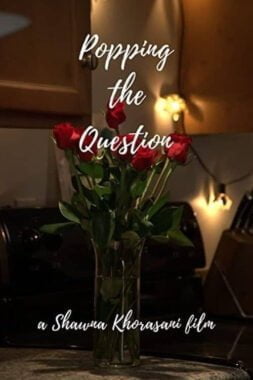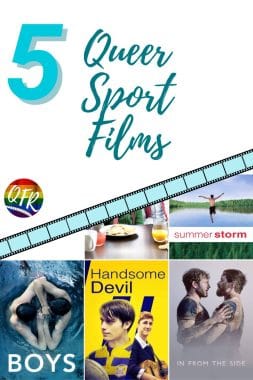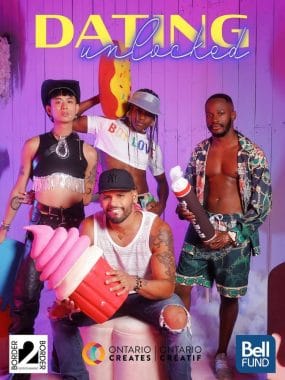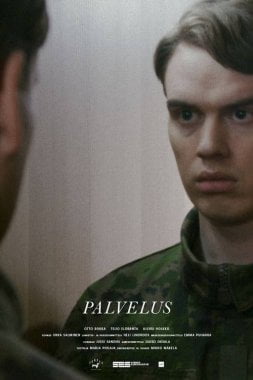A musical dream come true.
In “Were The World Mine”, Director/Writer Tom Gustafson takes his well-received short, “Fairies“, and expanded it into a feature length film that addresses the question: If you had a love-potion, who would you make fall madly in love with you? Additionally, he finally answers many of the questions we were left wondering from his short. Those answers are woven amid a retelling/twist of Shakespeare’s “A Midsummer Night’s Dream” and the magical world of fairies – except this time, “fairies” truly means “Queers”. But don’t be put off! While there are plenty of stereotypes and obviously-gay-traits included in this magical musical movie and some viewers might find them offensive, they are used in a manner that dually embraces our Queer identity while shattering a few of those stereotypes. As Timothy states, reciting the words of Puck:
Think but this, and all is mended,
That you have but slumbered here
While these visions did appear.
And this weak and idle theme,
No more yielding but a dream,
Gentles, do not reprehend:
If you pardon, we will mend:
A Midsummer Night’s Dream 5.1, 414-421

Synopsis of “Were the World Mine”
Timothy (Tanner Cohen) is the outcast at his all-boys boarding school in small-town USA – all because he’s openly gay. During a game of dodgeball that opens the film, he is the target of not only the balls thrown by the other boys, but also by the snide remarks from everyone including the coach. Timothy can’t escape the homophobic remarks and just wants to be left alone. However, his eccentric English teacher, Ms Tebbit (Wendy Robi) is quick to squash any such remarks in her classroom, they will NOT be tolerated. Meanwhile, she pushes the boy’s minds and imaginations by exploring Shakespeare. During class though, Timothy begins to daydream and fantasise on his crush – the captain of the school’s rugby team, Jonathon (Nathaniel David Becker). His fantasising is interrupted by Ms Tebbit announcing auditions for this year’s school play: “A Midsummer Night’s Dream.”
After school, Timothy meets up with his best friends Frankie (Zelda Williams) and Max (Ricky Goldman) where they jest about life and school while Max tries to guess how Timothy got his black eye. Unfortunately, Timothy’s mother, Donna (Judy McLane), doesn’t believe it was an accident; letting out frustration that we later learn stems from leaving Timothy’s father and moving to a new town to start over all because her son came out. Thankfully, she’s found a job selling makeup branded by the town’s icon, socialite, and the school’s headmaster’s wife, Nora Bellinger (Jill Larson). Skipping ahead to auditions, we get another bit of the magical fantasy when Timothy begins to sing; shyly at first but finding his voice which lands him the leading role of Puck! His high continues after a short interchange where his crush, Jonathon, tells Timothy “nice pipes” after listening to him audition.
But not everyone is happy about the play, nor the casting of boys as women. Coach Driskill (Christian Stolte) creates quite a stir and even draws in the headmaster (David Darlow) to try to resolve the issue – all because the play rehearsals take away from the school’s pride & joy: the winning rugby team. But Ms Tebbit holds her ground firm, even calling out their ignorance of theatre and school tradition of men performing the roles of women onstage. As rehearsal progress, the taunting and jests of homophobia towards Timothy and the “queerness” of the play itself continue. Even Timothy’s mom questions that the gay guy was cast as the lead fairy, but she ends up remaking her wedding dress into fabulous fairy wings to show her slowly building support for her son’s homosexuality. Things finally come to a head when while practicing his lines at home, Timothy discovers a secret recipe for a magical, purple love-pansy hidden within the play’s script. Being the dreamer, he gives it a try, but is disappointed when it does not work – until he reads the last line of the spell: SING.
Now the REAL “fairy” is released as Timothy weaves a magical spell full of vivid colour, his crush Jonathon, and a chorus of backup dancers of the rugby team (topless, winged, and wearing short shorts – of course!). When he wakes up from what seems to be another daydream, the flower lies before him. It’s magic is quickly put to the test when Max shows up to help Timothy learn his lines and is accidentally sprayed with the love potion. Suddenly straight Max is making the moves on Timothy! Timothy realises that the magic is real and that he now has the power to turn anyone he wants gay. The next day at rehearsal, encouraged by Ms Tebbit who mysteriously knows all about the purple flower’s magic, Timothy sprays the potion onto his crush. When Jonathon’s affection switches to Timothy and they lean in to kiss, another boy cries out “Eww, how nasty!” Urged on, Timothy starts spraying the love potion on everyone around – including the coach. Before we know it, the rugby team is being lead in ballet by a now-effeminate coach! As the magic spreads, even Nora and Timothy’s mother are affected when Timothy sprays Nora after she becomes disgusted after discovering that Timothy is gay.
Even though Timothy is thriving in his fantasy queer world come to life, the consequences are quickly building. As with the magic in “A Midsummer Night’s Dream,” the spell is too powerful. People are now going to crazy lengths in order to gain the affection of their “true love”: Nora is chasing after Donna, Coach is lusting after the Headmaster, both Max and Jonathon are literally fighting over Timothy’s affection. But Timothy is caught up in his affection for Jonathon, now that it’s finally reciprocated back; he is almost ignorant to the changes he has awoken all across the town. It becomes bad enough that those not affected try to cancel the school play! Thankfully, Ms Tebbit steps in and weaves a bit of magic herself to quell the unrest, advising that all will be explained during the play that evening. Unfortunately, Timothy is forced back down to reality by his mother and Ms Tebbit. The play goes forward and in the telling itself, the spell’s reverse is woven upon all; correcting the misguided “love & affection” in a sad yet solemn bout of acceptance. But is all lost? Nope – for after the play, Jonathon goes up to Timothy and confesses that he still loves him. Turns out that Jonathon was hiding in his own closet all along – Timothy get’s his happy ending after all!
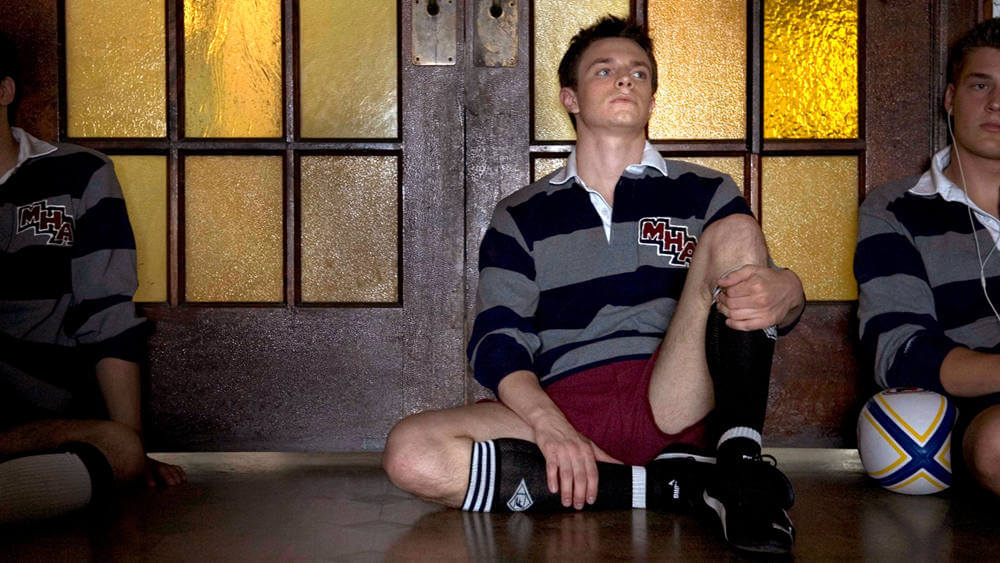
The Magical Mess
Overall, I love “Were The World Mine”. It’s a refreshing, new twist on one of Shakespeare’s iconic comedies that adds a queer element. When I first sat down to rate this film, it garnered high scores all around. But upon reflection, it unfortunately has a few issues I cannot ignore. Worse, some of the reasons for these weaker points have nothing to do with the film itself but were a result of homophobia from producers and even distributors.
In an interview with Alt Film Guide, Tom Gustafson noted that they faced anti-gay bias not only in trying to cast the roles, echoing concepts like “blacklisted”, but also in that they faced issues with getting the film into film festivals and even distribution. It took many awards for the few they could enter in, but the absence of such a highly acclaimed & award winning film from the larger festivals was noticeable. Additionally, Tom notes that they were quite lucky to be able to keep well-known stars like Judy McLane (Donna) & Jill Larson (Nora) with their limited, independent film budget.
While I simply love both of their performances, I do have to question whether it was a wise choice given the limited budget. Unfortunately, a few of the other cinematographic elements in “Were The World Mine” are a bit underwhelming. The sound quality is not always consistent (though greatly improved from the short, “Fairies!”) and the visual/editing elements are just a bit off; enough that it feels like an independent film rather than a studio produced feature film. As such, I couldn’t justify giving a full star for that category – but don’t let that diminish my fondness for this brilliant film!
The “Luscious” Bits
Ah, Ms Tebbit’s luscious bits – no, not THOSE bits! But the quirky, eccentric English teacher that the talented Wendie Robie helped create for the short film is one of the best parts of “Were The World Mine”. In some ways, she’s actually more quivalent to Shakespeare’s Puck than Timothy, when he’s portraying the role in his own life. Ms Tebbit drops Shakespearean quotes like they’re part of normal conversation, coaxing and guiding how all of the events unfold as if she is in control. Robie is the only cast member from the short film to repeat their role – but even Tom notes that there was no other choice.
Bouncing off of the specific incorporation of Ms Tebbit, the story and script itself is simply brilliant. Some would say that the film simply incorporates “A Midsummer Night’s Dream” within its own plotline. The concept for the short film “Fairies” was a one-joke film; “Were The World Mine” takes that concept and expands it into the feature length film that addresses many of the questions I was left with after watching “Fairies”. Tom Gustafson has stated: “When we decided to expand Fairies, we really wanted to use Midsummer – the story, the characters – as the real inspiration to all the expansions. So Were the World Mine really is much more of a retelling of Midsummer than Fairies.” At the start, there is a clear delineation between reality and Timothy’s fantasy world. However, as the story progresses and after the magic of the purple love-pansy is introduced, the lines begin to blur; even the dialogue morphs from a very modern prose to flairs of Shakespearean verse.
Yes, the characters in “Were The World Mine” are rather stereotypical. However, while some might view this as offensive and off-putting, it actually serves a poignant purpose. So many of the characters undergo changes that put them into the “other persons” shoes: the homophobic straight coach suddenly is teaching ballet to the rugby team with very flamboyant & effeminate mannerisms. The upper crust socialite Nora turns into a lusting lesbian who will throws aside her bias and hatred. If the characters did not go to the extremes of the stereotypes, the change would have been too subtle. There’s also a key lesson at the end – after everything is corrected and returned to “normal”, it’s not explicitly stated, but there’s a feeling that they all remember what happened. There’s an element of acceptance and a balance between the two extremes as the film wraps up. The coach is back to his normal straight mannerisms, but has a new appreciation for the play and Ms Tebbit. Nora reverses her whiplash reaction to Donna having a gay son. All is now right.
Lastly, I cannot ignore the fact that while this is a film with musical numbers, it’s not exactly a musical. But the numbers are another key reason why I love this film! Tanner Cohen has an incredible voice that just floats and brings the score & lyrics of Jessica Fogle and Tim Sandusky to life! Both Tanner and Nathaniel do their own singing, and their duet together just makes me melt. One thing that Tom Gustafson stressed regarding the musical numbers were that they moved the plot along, they weren’t just interspersed randomly. He and his talented team then pushed them into the outlandish visual escape from reality that is colourful, full of life – and glitter! Additionally, the costumes of the musical numbers in “Were The World Mine” are risqué and flamboyant. I absolutely love how the makeup design of both Timothy and Jonathon’s faces are split and opposite of each other in a way that compliments their connection. There’s a stunning visual impact made when they both first appear normal from the one side, before suddenly turning and revealing the magical side. Wow!

“The course of true love never did run smooth.” (A Midsummer Night’s Dream 1.1, 133) A powerful line from Shakespeare, yet it’s also an oft-repeated line in “Were The World Mine”, by writer/director Tom Gustafson. This brilliant independent film weaves a retelling of Shakespeare’s iconic play with a queer twist. By creating a colourful dream-like fantasy musical, we are given an answer to the question: what would you do if you had the power to make someone love you? It’s not all a fairy tale, with a handful of consequences resulting in an acceptance of reality. But not all is lost, love still prevails! I highly encourage you to give this film a watch – it will draw you into its spell.
Give me your hands if we be friends,
And Robin shall restore amends.
A Midsummer Night’s Dream 5.1, 427-429
Queer Relevance of “Were the World Mine”
Just like the short film it’s based upon, “Were The World Mine” is most definitely a queer film! Expanding upon the issues of homophobia, bullying, and the pressures of being gay at an all-male boarding school, this feature film version also touches on areas the short film “Fairies” overlooks. Now we get to understand how Timothy’s mother copes with her son’s homosexuality and even faces homophobia by proxy (while equally standing up for her son!)When Timothy uses the flower’s magic to spell the entire town, we even get a glimpse of what a world where being gay or different was not only legal but the norm.
Oh, and we have even more of the fairy magic, singing, dancing, and glitter! “Were The World Mine” is certainly a queer extravaganza.










